Carol Cox is the grant compliance specialist at PRIDE, which works to clean up rivers and stop illegal dumping of trash in Kentucky.

Monday, 27 Nov 2000
SOMERSET, Ky.
Today, I want to give you some background information about Personal Responsibility In a Desirable Environment (PRIDE). Rep. Harold “Hal” Rogers (R-Ky.) and James Bickford, the cabinet secretary of Natural Resources and Environmental Protection in Kentucky, announced the PRIDE initiative in the summer of 1997. PRIDE is the first comprehensive, region-wide, local/state/federal cooperative effort designed to address the serious challenge of cleaning up the sewage and garbage in southern and eastern Kentucky’s rivers and streams, ending illegal trash dumps and promoting environmental awareness and education while renewing pride in the region.

Down in the dumps: a dumpsite at Cargill.
The two main pollution sources in our region are straight pipe sewage discharge and illegal dumping of trash. A total of 1,996 illegal dumps were mapped in the 40-county PRIDE region. Many people, because of lack of money to install a septic tank, use a straight pipe to rid their homes of sewage, which pollutes nearby streams. Straight pipe sewage discharge has become a major source of water pollution in our region, impacting the health and quality of life for everyone in southern and eastern Kentucky. Throughout the region, a total of 36,319 straight pipes and failing septic systems have been mapped. As a result, PRIDE established a Septic System Loan fund to help homeowners install health department approved septic systems at these homes. Thanks to PRIDE, approximately 2,680 households now have functional septic systems or are hooked up to city sewer lines.
We have also established a PRIDE Community Grant Program to provide funds for environmental improvement projects. The program awards grants of up to $5,000 for local clean up activities, appliance buy-back programs, recycling programs, the purchase of certain equipment, and other environmental restoration projects. These grants are awarded once a year to city and county governments, environmental advocacy groups, and civic and community organizations. The program was established in July 1998 and has since allocated over $5,624,129 in grant funds. To date, PRIDE Community Grant funds have been used to clean up 610 illegal dumps and 123 miles of streams; purchase 132 pieces of recycling equipment and 29 video surveillance cameras; and fund 28 white appliance buy-backs, one hazardous materials drop-off, and five watershed watch programs.
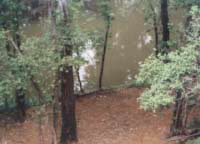
The same site as above, all cleaned up.
We’re in the process of developing a new Community Grant initiative called SuperGrants. These grants, to be awarded next spring, will be used to cleanup massive dumpsites.
PRIDE developed an Environmental Education Grant Program in November of 1998 and has released over $880,252 in grant funds. This program provides funds for environmental education projects. These grants of up to $5,000 are available for constructing outdoor classrooms, establishing recycling programs, purchasing curriculum materials, and other environmental education outlets. To date, PRIDE Environmental Education Grant funds have been used to construct 119 outdoor classrooms, establish 14 school recycling programs, purchase eight EnviroScape learning tools, one recycling robot, and resources for Project WET/WILD/Learning Tree.
Project Clean Streams is PRIDE’s latest environmental education initiative. The program was developed to teach our youth how water resources affect our health and economic development. PRIDE provided water testing kits and educator training to all schools willing to participate. Students from across our region collected fecal coliform samples for analysis.
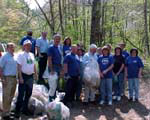
A group of volunteers with Rep. Rogers.
PRIDE also provides resources for water and wastewater infrastructure needed to eliminate water pollution problems through the U.S. Army Corps of Engineers Section 531 Program. This program offers grants to communities, counties and other public entities for wastewater treatment projects that include traditional sewage treatment facilities and innovative wastewater treatment methods such as wetlands, sand filtration systems, cluster holding systems, and others.
PRIDE’s approach is to work on a regional level to solve problems. PRIDE has asked that every citizen in the 40 county region become involved in this effort to help clean up southern and eastern Kentucky. As a result, over 31,684 people have worked more than 123,096 hours on PRIDE cleanup events. The success of the PRIDE initiative is dependent upon residents working together to make Kentucky a cleaner, healthier place to live.
Tuesday, 28 Nov 2000
SOMERSET, Ky.

Putting PRIDE on the map.
Illegal dumps are a major problem throughout the 40-county-region served by PRIDE. Approximately 60 percent of the illegal dumps in Kentucky are found within our region.
PRIDE attacks illegal dumps primarily through our Community Grant program. We’ve provided Community Grant funds to clean up 31 percent of the 1,996 illegal dumps mapped in our region. Community Grant recipients must provide photographic documentation of both the dumps and the results of dump clean up activities. The PRIDE compliance officer, Dave Thomas, makes site visits to each grant recipient to ensure that grant funds are properly spent.
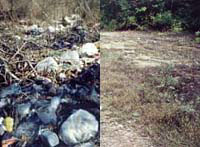
Before and after photos of a dump at Bucks Creek.
In addition to providing funds to clean up illegal dumps, PRIDE Community Grants also provide funds for local governments to purchase video surveillance cameras to record people who illegally dispose of trash. Video surveillance cameras have been used to document illegal dumping activities and win court convictions against people who unlawfully dump trash. In a recent case in Johnson County, someone caught by a surveillance camera was cited for illegally dumping garbage in a roadside dump. The dumper was required to prepay two-year’s worth of curbside garbage pickup, remove four tons of garbage from the roadside dump, pay the costs of cleaning up the dump, and was fined an additional $5,000.
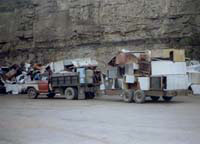
A loaded truck at the Letcher buy-back.
Several counties in the PRIDE region have used Community Grant funds to conduct white appliance buy-backs. Buy-backs are used remove larger items from illegal dumps, making the remainder of the dump easier to clean up. Discarded appliances are redeemed at controlled drop-off locations. A white appliance buy-back in Lawrence County netted 4,448 white appliances. A Knott County buy-back collected 3,995 appliances and a buy-back in Letcher County brought in 2,739 appliances. Approximately 800 volunteers helped collect these white appliances.
Thousands of volunteers participate in our a
nnual PRIDE Spring Cleanup and assist with illegal dump, roadside, and shoreline clean ups year round. Our volunteers are an invaluable part of the PRIDE team.
Speaking of teams, the PRIDE office has a small staff — just six people. At any moment, we have approximately 300 active grants. As grants specialist, my job is to track the paperwork to make sure that all required documentation is in place.
Wednesday, 29 Nov 2000
SOMERSET, Ky.
I’m pulling double duty today. Sandy Elswick, PRIDE’s receptionist extraordinaire, is on vacation. It’s not uncommon for us to field a couple of hundred calls a day, ranging from grant-related questions to “my neighbor has a straight pipe running into the creek above my house” to callers who just needs someone to listen to their problem.
The first call of the day was about the PRIDE Environmental Education Program. One of our education grant recipients was concerned about the types of trees she should plant in her outdoor classroom. I was able to put her in touch with a source from the Kentucky Division of Forestry and an agent from her local Natural Resource Conservation Service.
Environmental education is a lifelong learning process that encourages understanding of actions beneficial to the environment. Educating our youth — and their teachers — is a primary component of PRIDE’s mission. Cathy Hall, our education coordinator, spearheads this effort.
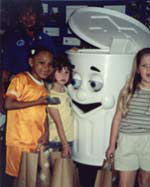
Here’s Curby, the recycling robot.
The Environmental Education Grant program is our primary educational tool. Grant funds are available to eligible schools and non-profit organizations throughout our 40-county region. The program has provided funds for EnviroScape learning tools, curriculum materials, a recycling robot, and outdoor classrooms. The outdoor classrooms range from trails that peacefully wind through the wilderness to full-blown outdoor science laboratories, complete with weather stations.
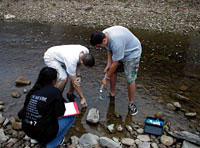
Students sample a stream.
PRIDE has developed an environmental education curriculum, which includes our Kids Can Make A Difference video, teacher resource guides, activity books, and other educational resources. These materials were distributed to over 450 schools throughout our region. The curriculum was designed to educate young people about the importance of keeping our environment clean and features J. Waterford, an environmentally literate frog, Daniel Boone, and Lily, a young person in need of J. Waterford’s expertise. These materials are available free of charge to all of the schools in our region.
Our latest initiative is Project Clean Streams. The program was designed to get students outside for a first-hand look at the condition of local streams. PRIDE provided field test kits and educator training. Our goal was to include 100 schools in the project. We trained over 170 teachers, and over 6,000 students from 148 schools conducted chemistry field tests, biomonitored the area (critter counts), collected fecal coliform samples, and photo-documented nearby streams. Students and teachers could submit their field reports online and immediately compare their results with other schools on the Internet. Next year, we plan for the project to be even bigger and better.
Through education, we hope to create environmentally literate citizens who are prepared to make wise decisions to preserve Kentucky’s resources for generations to come.
Thursday, 30 Nov 2000
SOMERSET, Ky.
My nephew and I turned over rocks in the creek last night looking for fauna (yes, it was very cold!). At seven, Jarod can already identify the critters faster and with more authority than I. We have been surveying the same area regularly since March of this year. He recognizes that the same critters aren’t always there and that the creek doesn’t always smell or look the same.
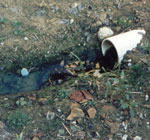
Discharge from a straight pipe.
Water quality is a major concern in our region. A total of 36,319 straight pipes and failed septic systems have been mapped in the 40-county area. Homeowners, and the water quality of nearby streams, have benefited from PRIDE septic system loans in all 40 counties.
One of the most integral members of the PRIDE team is Jan Falconberry, our Septic System Loan Manager. Jan manages the approximately 2,680 loans that have been issued by PRIDE. The loan program provides low-rate (0 to 6 percent), long-term financing (five to 15 years) for the installation of approved household treatment systems to eliminate straight pipe discharge and failed septic systems. PRIDE loan funds may be used to install new systems, repair failing systems, or provide hookup to a municipal sewer system.
PRIDE Community Grant funds have also been used to rehabilitate streams and lakes in our region. Community Grants have funded the clean up of 123 miles of streams and stream banks. We have also provided funds to nonprofit groups that perform annual lake clean ups.
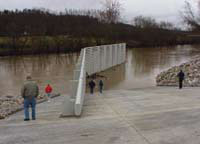
The Trash Gate.
PRIDE also has a couple of unique ways of improving the water quality in our region: the Lake Cumberland Debris Management System and the Trash Hunter Vessel. The Lake Cumberland Debris Management System, affectionately known as the “Trash Gate,” was installed on the Cumberland River in January of 1999. The Trash Gate captures trash floating down the Cumberland River, which allows garbage and debris to be harvested for proper disposal. Since its installation, the Trash Gate has collected over 1,500 cubic yards of material. It’s located above Cumberland Falls, which is a benefit to the burgeoning ecotourism industry in Eastern Kentucky. The Trash Gate concept is now being considered for other rivers and streams.
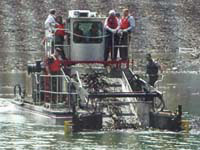
The Skimmer Boat.
The Trash Hunter Vessel, known as the “Skimmer Boat,” was christened the SS Kentucky PRIDE in April of 1999. The “mouth” of the Skimmer Boat hauls garbage and debris onto a conveyor system, then the accumulated material is off-loaded. The SS Kentucky PRIDE is stationed at Fishtrap Lake in Pike County, and has removed approximately 1,000 cubic yards of garbage and debris from the lake. The boat is portable, and has been relocated periodically for use on other lakes.
PRIDE is devoted to improving the quality of the water in our region. We have funded a study to assess the current quality of the water in our area and will continue to monitor the water quality as the benefits from our loan program, Community Grant program, the Trash Gate, and Skimmer Boat are realized.
Friday, 1 Dec 2000
SOMERSET, Ky.
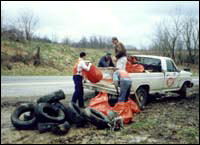
Volunteers load up trash.
One of the things I really like about working for PRIDE is being able to see evidence of what we have accomplished. It is exhilarating to drive by a former dumpsite and see grass growing, or a school and see kids studying in an outdoor classroom funded by PRIDE. But one of our most important accomplishments isn’t as easily measured — the spirit of volunteerism. I spoke with one of our most dedicated volunteers this morning; he was excited about
the activities he already has planned for the PRIDE 2001 spring clean up (scheduled for late next April!). More important, his excitement is contagious.
PRIDE couldn’t function without volunteers, and some of our most important volunteers are the members of the executive committee of our board of directors. These dedicated people are:
- Tony Turner, our chairman, news director for WYMT, a regional television station
- Bob Mitchell, our vice chairman, the district administrator for Rep. Hal Rogers
- Jean Dorton, our secretary, the director of the Rural Community College Initiative at Prestonsburg Community College
- Maurice Moore, our treasurer, the solid waste coordinator for Pulaski County
- Hugh Archer, the commissioner of the Kentucky Department for Natural Resources
- A.L. Sinclair, a forest ranger/technician for the Kentucky Division of Forestry
- Richard Thomas, principal assistant to James Bickford, secretary of the Natural Resources and Environmental Protection department
Their services are available to PRIDE 24/7 and we owe them more than we could ever repay.
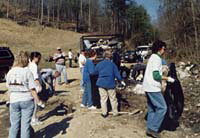
Board member Jean Dorton lends a hand at a clean up.
Our local coordinators make up another group of invaluable volunteers. Each of our 40 counties and some of the individual cities have designated PRIDE coordinators. These people faithfully plan activities for our spring clean up events. They are responsible for organizing the clean up groups, scheduling contractors, working out timetables, ensuring that the proper equipment is where it is needed, arranging for disposal of the accumulated garbage, and juggling the multitude of tasks associated with any event. Because of this monumental undertaking, we are now working to establish PRIDE committees in each county to assist our local coordinators.
In addition to the designated PRIDE coordinators, some individuals take the initiative to conduct clean up events. Tony Lewis, a Perry County volunteer, organized a clean up along a creek where he grew up. Tony wanted his sons to be able to swim in the creek, just like he did as a child. Since Tony started his campaign, over 100 junk cars have been towed out of the creek. During the PRIDE clean up this past spring, volunteers collected approximately 1,500 bags full of garbage from the creek and its banks. Tony’s clean up drew at least one person from each of the 43 homes along the Fort Branch creek. Once a month, Tony leads a group of kids to pick up litter along roadways. Tony’s sons still can’t swim in the creek, but thanks to the efforts of people like Tony, someday they will. You see, now that Tony has cleaned up Fort Branch, he is organizing citizen groups for clean ups in two other Perry County communities.
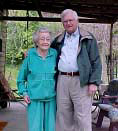
Rosa Armatige.
Rosa Armatige is another dedicated PRIDE volunteer. She never misses a PRIDE clean up event. Rosa, a 95-year-old Menifee County resident, picks up garbage with her cane.
Volunteers can have other effects besides their physical efforts. After watching his grandson spend a long, hard day helping to clean up an illegal dump, a Casey County resident, with tears in his eyes, confessed that he had been a contributor to the illegal dump and pledged that he would never improperly dispose of trash again. He was dismayed to see his grandson cleaning up a mess that he had helped make.
I have lived in several states and traveled extensively in almost all of the states. I consider Kentucky to be one of the most beautiful places God created. Under the leadership of Karen Engle, our executive director, PRIDE will continue to succeed and one day this area will be as close to pristine as we can possibly make it. We want others to visit Kentucky and fall in love with her natural beauty. But, as Secretary Beckford says, “our trash isn’t unique and no one will pay to come see it.”

